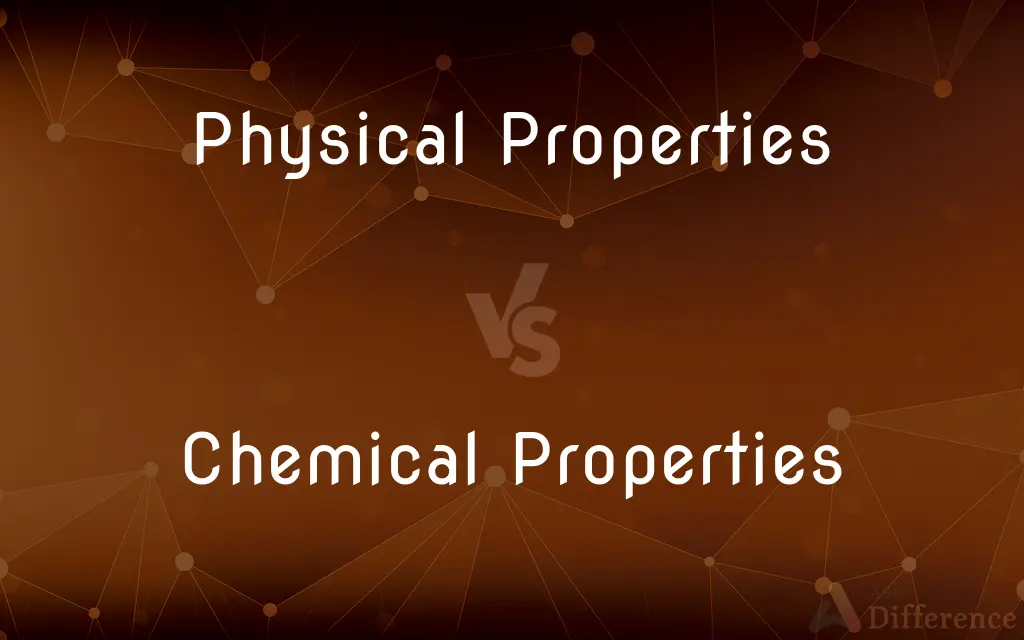Physical Properties vs. Chemical Properties — What's the Difference?
By Tayyaba Rehman — Published on November 11, 2023
Physical Properties describe matter's appearance or state; Chemical Properties explain how matter behaves in chemical reactions.

Difference Between Physical Properties and Chemical Properties
Table of Contents
ADVERTISEMENT
Key Differences
Physical Properties of a substance refer to characteristics that can be observed or measured without changing the substance's identity. These include properties such as color, density, and melting point. On the flip side, Chemical Properties describe a substance's ability to undergo chemical reactions, thus changing its identity.
Physical Properties, such as mass or volume, give insight into the state or condition of a substance without implying any change in its molecular composition. However, Chemical Properties, such as reactivity with acid, refer to potential changes a substance can undergo when subjected to certain conditions, resulting in the formation of new substances.
The identification of Physical Properties is often easier since they require no change in the substance’s composition. In contrast, understanding Chemical Properties often requires the substance to undergo a chemical change, showcasing its reactivity or lack thereof.
Determining Physical Properties is vital in daily life, from understanding the solidity of ice to the viscosity of oil. On the other hand, knowledge of Chemical Properties is crucial for chemical engineering, medical applications, and various other scientific pursuits, as it involves understanding the transformations a substance can undergo.
Comparison Chart
Nature
Observable without changing identity
Observed during chemical reactions
ADVERTISEMENT
Examples
Density, melting point, color
Reactivity, combustibility, acidity
Changes
No change in composition
Results in new substances
Determination
Direct observation/measurement
Through reactive processes
Significance
Describes state or condition
Describes potential transformations
Compare with Definitions
Physical Properties
Attributes detailing matter's state or form.
Gold's malleability is one of its distinctive physical properties.
Chemical Properties
Characteristics shown during chemical reactions.
Hydrogen's explosiveness with oxygen is one of its chemical properties.
Physical Properties
Descriptors of appearance or condition.
Iron's magnetic nature is among its physical properties.
Chemical Properties
Attributes indicating reactivity or transformation.
The tendency of iron to rust in moisture indicates its chemical properties.
Physical Properties
Characteristics observable without altering identity.
Ice's solidity at freezing temperature is one of its physical properties.
Chemical Properties
Features revealing how matter interacts chemically.
Sodium's violent reaction with water is due to its chemical properties.
Physical Properties
Traits identifying substance's external aspects.
The luster of a diamond reflects its physical properties.
Chemical Properties
Traits specifying substance's behavior in reactions.
Silver tarnishing in the presence of sulfur indicates its chemical properties.
Physical Properties
Features measurable without changing composition.
The transparency of glass showcases its physical properties.
Chemical Properties
Descriptors of potential molecular changes.
The inertness of noble gases is one of their chemical properties.
Common Curiosities
Can physical properties be easily observed?
Yes, physical properties can be observed or measured without changing the substance's identity.
Do chemical properties change a substance's identity?
Yes, observing chemical properties often involves a chemical change that forms new substances.
Are color and texture physical properties?
Yes, both color and texture are examples of physical properties.
Can physical properties change under different conditions?
Yes, physical properties like state or density can change with temperature or pressure, but the substance remains the same.
Can flammability be considered a chemical property?
Yes, flammability is a chemical property as it describes how a substance reacts with fire.
Is density a physical or chemical property?
Density is a physical property as it can be measured without changing the substance's identity.
Why are chemical properties crucial for scientists?
They help predict and understand the chemical reactions a substance can undergo, essential for research and applications.
How do chemical properties differ from chemical changes?
Chemical properties describe potential reactions, while chemical changes are the actual reactions taking place.
What dictates a substance's chemical properties?
Chemical properties are dictated by the arrangement and type of atoms in a substance.
Why is understanding physical properties important?
Physical properties provide insight into a substance's condition, appearance, and state, which is crucial for various applications.
Is the reactivity of a substance a chemical property?
Yes, reactivity indicates how a substance might react with others, which is a chemical property.
Are physical properties consistent across all samples of a pure substance?
Yes, for a pure substance, physical properties remain consistent across different samples.
Is solubility a physical or chemical property?
Solubility is a physical property, describing the amount of substance that can dissolve in a solvent without a chemical change.
Can observing a chemical property be potentially dangerous?
Yes, some reactions like combustibility can be hazardous if not handled properly.
How are physical and chemical properties related to the atomic structure?
Atomic structure and bonding determine both physical and chemical properties.
Share Your Discovery

Previous Comparison
Online Learning vs. Classroom Learning
Next Comparison
Microsoft vs. WindowsAuthor Spotlight
Written by
Tayyaba RehmanTayyaba Rehman is a distinguished writer, currently serving as a primary contributor to askdifference.com. As a researcher in semantics and etymology, Tayyaba's passion for the complexity of languages and their distinctions has found a perfect home on the platform. Tayyaba delves into the intricacies of language, distinguishing between commonly confused words and phrases, thereby providing clarity for readers worldwide.











































